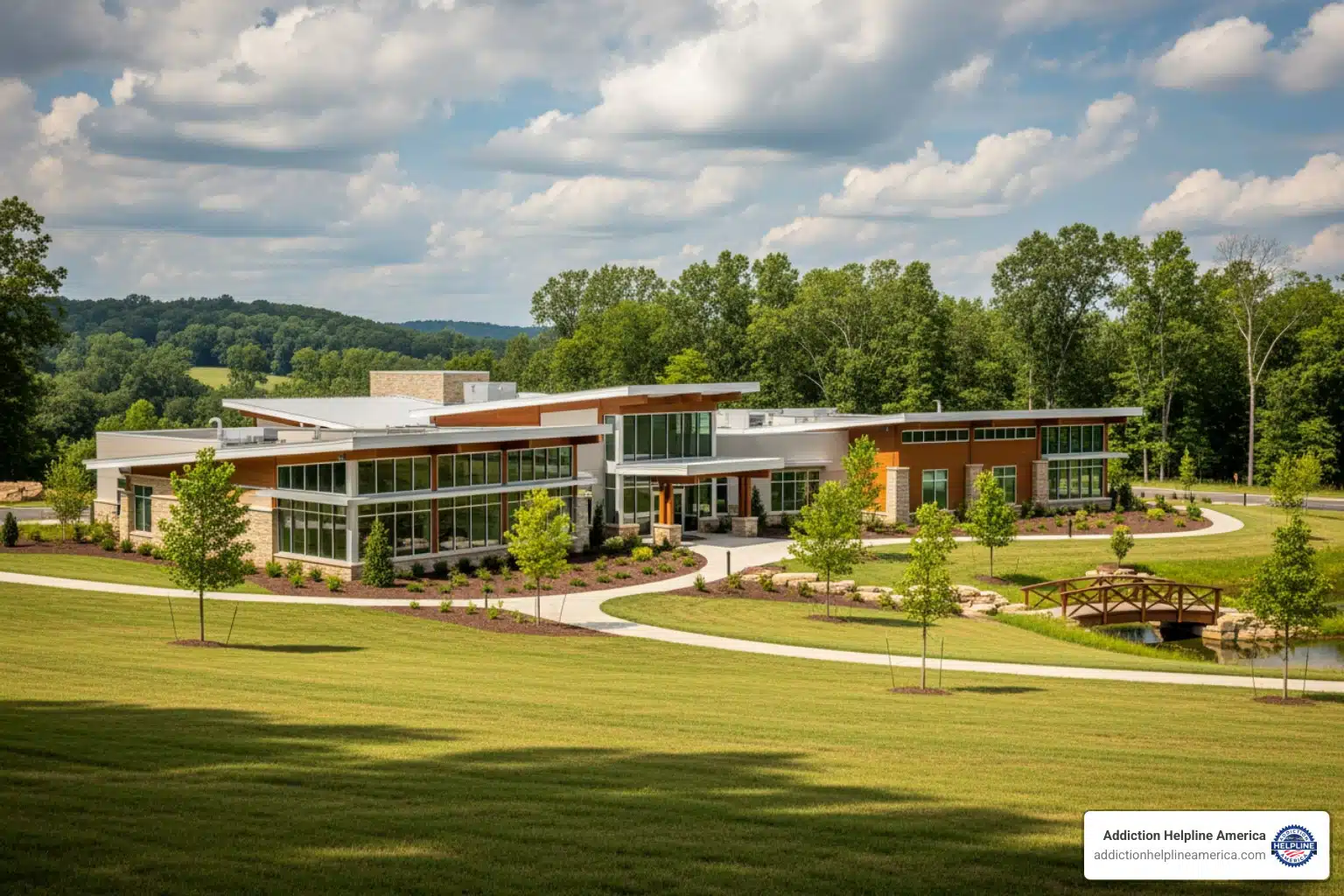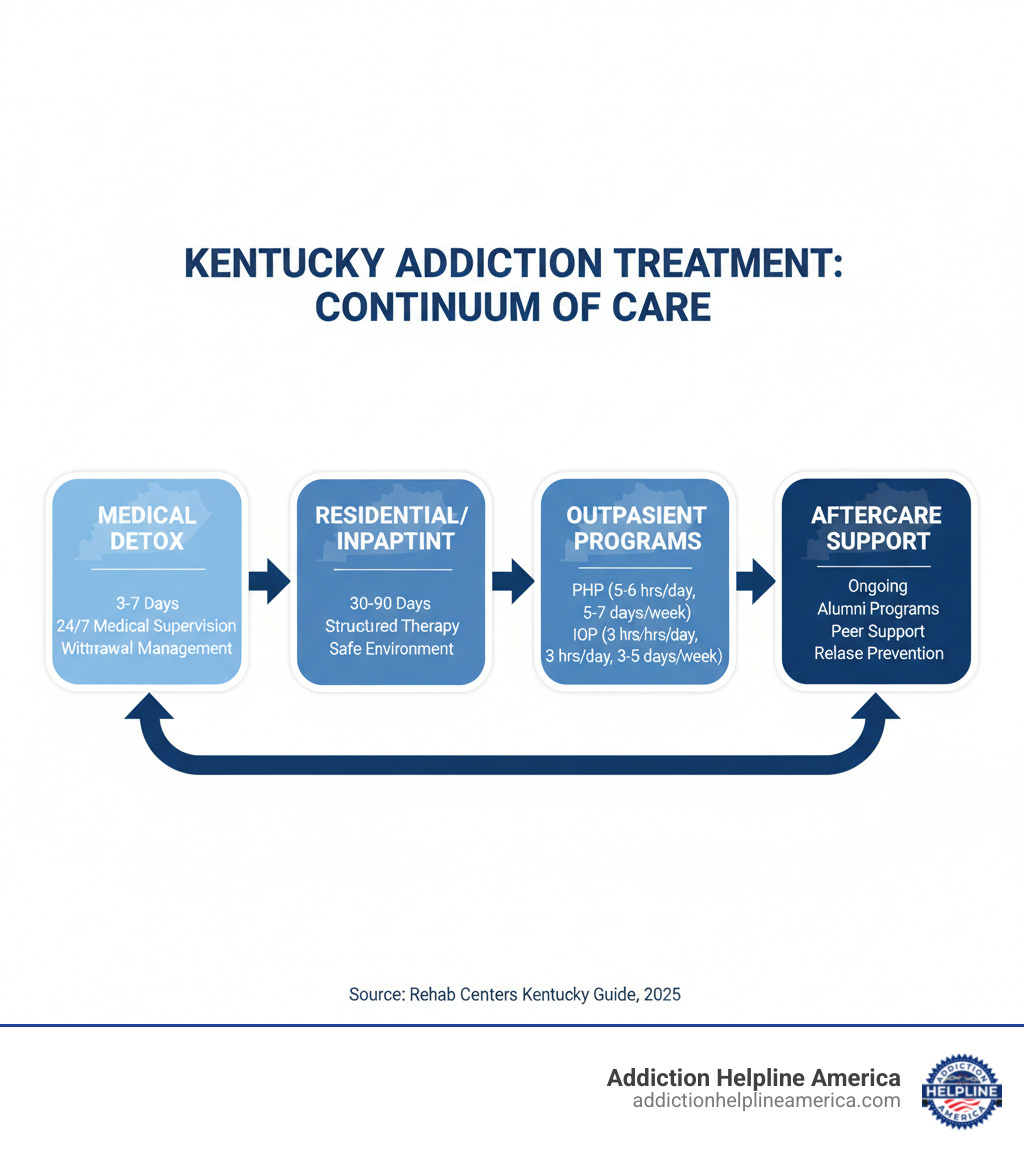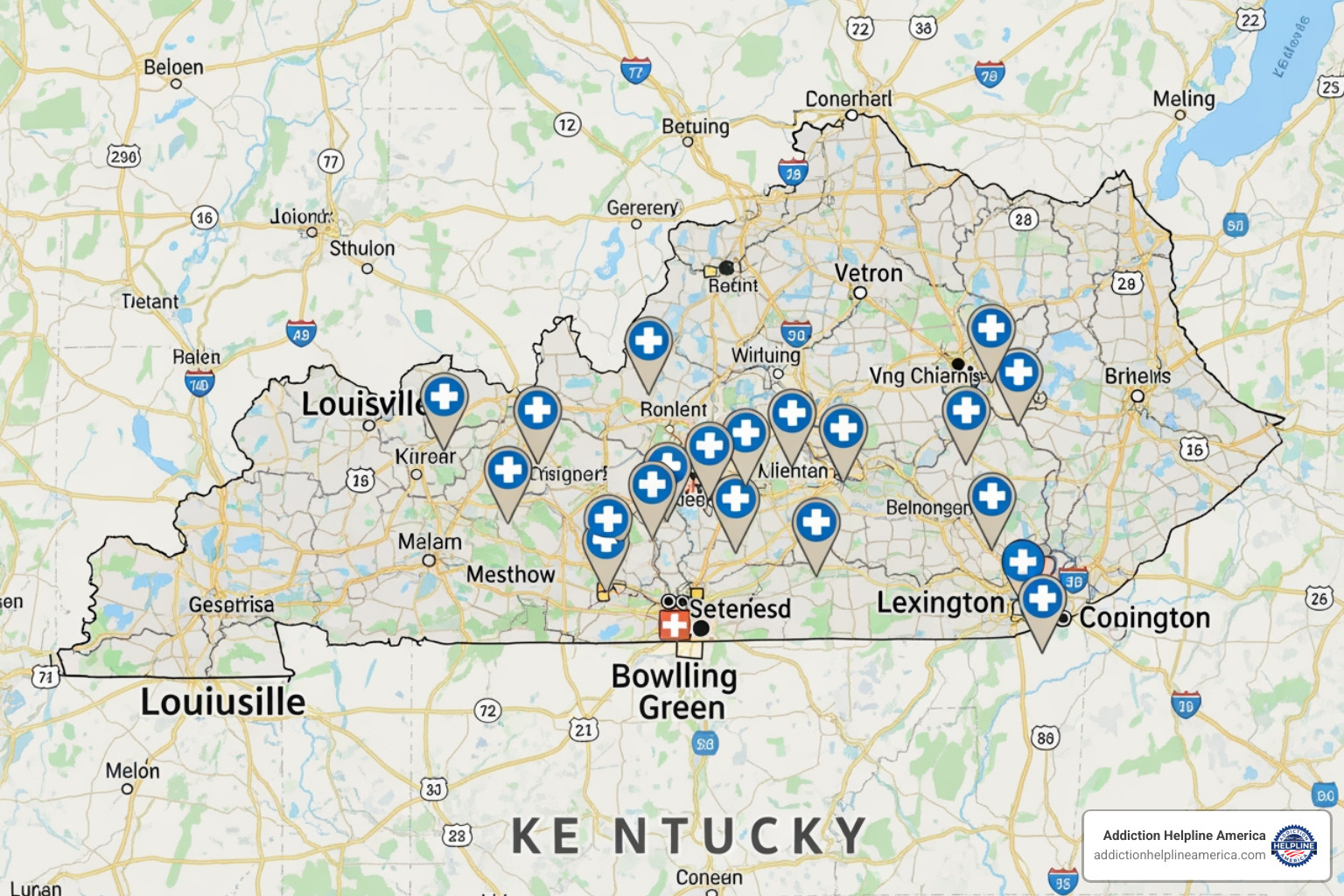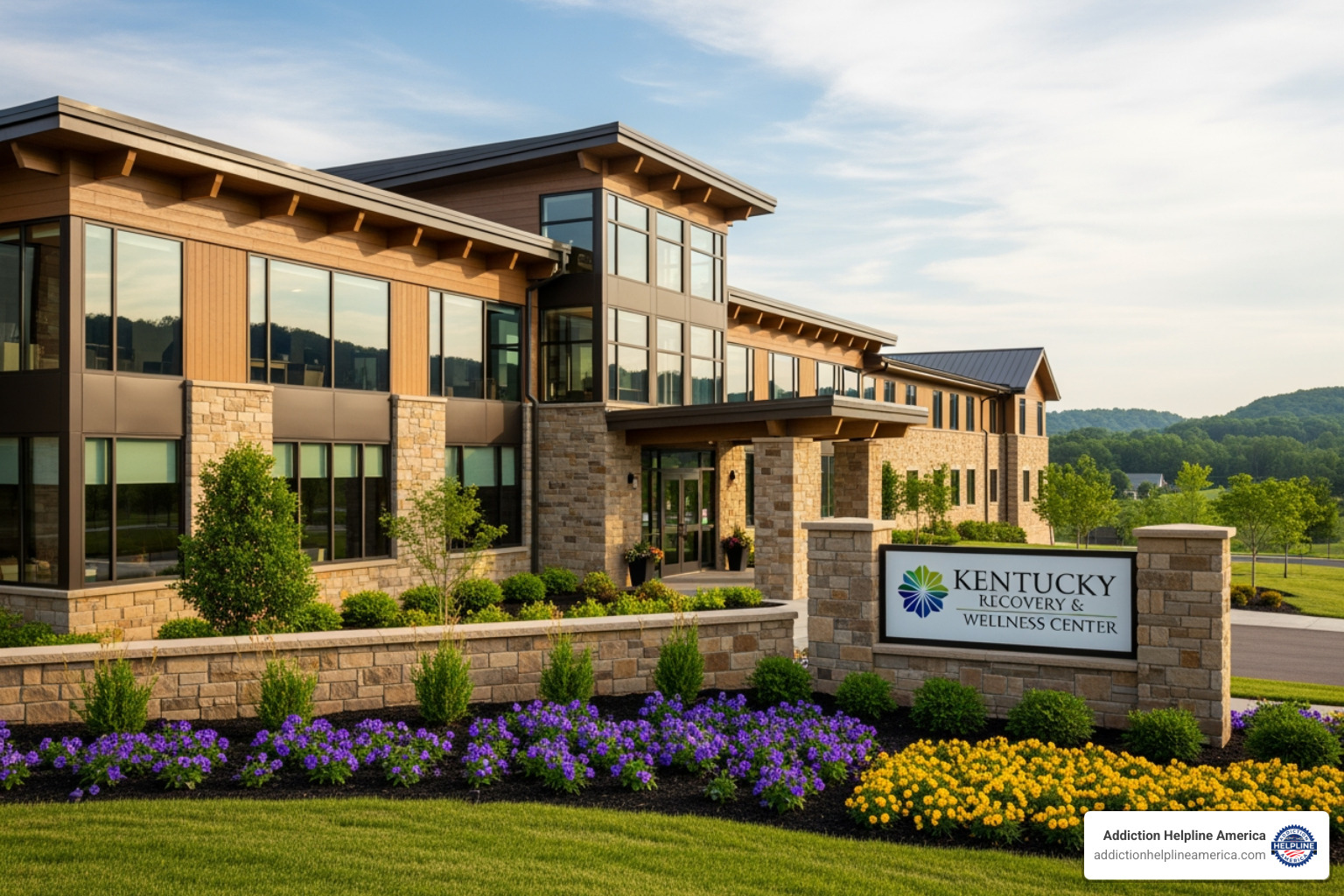
Understanding Your Options for Addiction Treatment in Kentucky
Rehab centers Kentucky offer a wide range of treatment options for individuals and families seeking help with substance use disorders. If you’re searching for immediate assistance, here’s what you need to know:
Quick Guide to Finding Kentucky Rehab Centers:
- State-Run Programs: 13 Recovery Kentucky centers provide housing and recovery services for up to 2,000 Kentuckians across the Commonwealth.
- Hotlines: Call KY HELP at 1-877-318-1871 (Mon-Fri 7am-10pm, Sat-Sun 8:30am-5:30pm) or KY-OAR at 1-800-854-6813 (after hours).
- Treatment Types: Medical detox, inpatient residential (30+ days), intensive outpatient (IOP), partial hospitalization (PHP), and aftercare programs.
- Average Costs: Residential care averages $57,033, but insurance, Medicaid, and payment assistance can significantly reduce out-of-pocket costs.
- Specialized Care: Programs for opioid/fentanyl addiction, methamphetamine, alcohol, dual diagnosis (mental health + addiction), and specific populations (LGBTQ+, veterans, teens).
Kentucky faces a significant addiction crisis, with nearly 2,000 overdose deaths reported in a recent year, the vast majority involving fentanyl and opioids. Additionally, about 16% of adults misuse alcohol, and the state has one of the nation’s highest binge drinking rates. Compounding this, over 17% of adults report frequent poor mental health.
These numbers represent real people who need help. The good news is that effective treatment exists. Kentucky has a network of recovery resources, from nonprofit community organizations to specialized centers offering medication-assisted treatment, dual diagnosis care, and holistic therapies. There are multiple pathways to recovery.
Finding the right treatment center can feel overwhelming when you’re in crisis. You might not know where to start, what questions to ask, or how you’ll afford care. That’s why understanding the full spectrum of available options is so important.
At Addiction Helpline America, we’ve helped thousands of individuals and families steer the complex landscape of Rehab centers Kentucky offers, connecting them with appropriate treatment options based on their unique circumstances and needs. Our team understands both the urgency of addiction and the importance of finding care that addresses the whole person.
This guide will reveal five effective strategies for finding quality addiction treatment in Kentucky, including resources you may not have considered and insider knowledge about how the state’s recovery system actually works.
1. Leverage State and Community-Led Initiatives
This is a powerful, often overlooked, first step for finding accessible care.
When you’re searching for help with addiction, it’s easy to feel lost. But here’s something many people don’t realize: Kentucky has built an impressive network of state and community programs specifically designed to help people like you. These are real, accessible resources that have helped thousands of Kentuckians find their path to recovery.
Recovery Kentucky stands out as one of the most comprehensive state initiatives. This program represents a collaboration between the Department for Local Government, the Department of Corrections, and the Kentucky Housing Corporation. It tackles two interconnected problems at once: addiction and homelessness.
The program operates 13 Recovery Kentucky centers across the Commonwealth, providing both housing and recovery services for up to 2,000 individuals. These are structured environments where residents learn daily living skills, participate in peer support groups, and take on job responsibilities that help rebuild their confidence and independence. The goal is to help people regain control of their lives and transition into permanent housing.
Beyond state programs, Kentucky’s community-focused nonprofit organizations offer some of the most effective treatment available. Many take a holistic approach that considers every aspect of a person’s life—physical health, mental wellbeing, education, and employment. They understand that recovery isn’t just about stopping substance use; it’s about rebuilding an entire life. Some have even pioneered models that integrate vocational training and educational opportunities directly into the recovery process, recognizing that having a purpose and a path forward dramatically improves long-term success rates.
The Kentucky Opioid Response Effort (KORE) works to expand access to evidence-based prevention, treatment, recovery, and harm reduction services across the entire state. These community partnerships matter because they’re deeply rooted in local communities and understand the specific challenges Kentuckians face.
When you’re looking for rehab centers Kentucky offers, starting with these state and community initiatives can open doors you didn’t know existed. Many of these programs offer services at little or no cost, and they’re often more accessible than private treatment centers.
Learn more about Kentucky recovery programs
2. Connect with Local Law Enforcement and Community Support Programs
You might be surprised to learn that local law enforcement and community groups are key allies in connecting people to treatment.
Some of the most direct pathways to addiction treatment in Kentucky come from an unexpected source—your local police department. While it may seem surprising, Kentucky has pioneered a remarkable approach where law enforcement acts as a gateway to recovery.
The Kentucky State Police (KSP) Angel Initiative has completely reimagined how we connect people to care. The concept is simple: if you’re struggling with addiction, you can walk into any of the 16 KSP Posts across the Commonwealth and ask for help. No arrest. No judgment. A trained officer or volunteer will help connect you directly with treatment centers. This no-questions-asked approach removes the fear and stigma that stops so many people from reaching out.
Operation UNITE (Unlawful Narcotics Investigations, Treatment, and Education) offers another critical lifeline. Their toll-free Treatment Referral & Help Line at 1-866-90-UNITE connects anyone seeking help to appropriate resources. Their Treatment Voucher program helps low-income individuals in UNITE’s 32-county service area cover the costs of residential treatment. They also provide information about Drug Court and After-Care Support Groups.
These aren’t just referral services—they’re community-focused support systems built on the understanding that addiction is a health crisis, not a criminal one. Organizations like UNSHAME Kentucky are working to shift public perception through education and real stories from people in recovery. For Lexington residents, Get Help Lex provides an online tool to locate local facilities and services.
What makes these local police initiatives and community outreach programs so effective is their accessibility. They offer walk-in assistance when traditional treatment pathways feel overwhelming. These programs are part of a broader destigmatization campaign that’s changing how Kentucky approaches addiction—not as a moral failing, but as a treatable condition that deserves a compassionate, immediate response.
Find local support and treatment options
3. Use Hyper-Local and Specialized Online Directories
Going beyond a generic search can connect you with facilities that have immediate openings and meet your specific needs.
When you’re searching for help, time matters. A generic search for “rehab near me” can be overwhelming. This is where specialized directories and state-specific resources become your best friend.
Kentucky has built some powerful tools specifically for this purpose. The most direct way to find immediate help is through the KY HELP Statewide Call Center at 1-877-318-1871. This isn’t just a recorded message—it’s staffed by real people who understand the Kentucky treatment landscape. They can tell you which Rehab centers Kentucky has that are actively accepting new clients, help you understand your insurance coverage, and match you with programs that fit your specific needs.
For those late-night moments when crisis hits, the Kentucky Opioid Assistance and Resource Hotline (KY-OAR) at 1-800-854-6813 provides after-hours support. Having these numbers saved can make all the difference.
Online directories offer another powerful search option. The Substance Abuse and Mental Health Services Administration (SAMHSA) operates a national Behavioral Health Treatment Services Locator. You can filter specifically for Kentucky facilities to find certified treatment providers.
What makes these specialized directories so valuable is the ability to filter by your exact circumstances. Need a facility that offers medication-assisted treatment for opioid addiction? Looking for a program that accepts Medicaid? Searching for gender-specific treatment or a center that addresses co-occurring mental health disorders? These platforms let you narrow down hundreds of options to the handful that truly fit.
The key is moving beyond that first, overwhelming Google search. By using these hyper-local and specialized tools, you’re not just finding any treatment center—you’re finding the right treatment center for your specific situation. And that targeted approach can make all the difference in starting your recovery journey with confidence.
Find treatment and recovery openings now
4. Investigate Comprehensive Care Models Beyond Basic Rehab
The best centers treat the whole person, not just the addiction, offering surprising pathways to long-term success.
Here’s something many people don’t realize: addiction is almost never just about the substance. It’s tangled up with past trauma, mental health struggles, and the practical challenges of daily life. That’s why the most effective Rehab centers Kentucky offers go far beyond just getting someone through detox. They understand that real, lasting recovery means addressing every part of a person’s life—mind, body, and spirit.
A holistic approach is at the heart of this philosophy. Many centers, some set in Kentucky’s peaceful countryside, integrate practices like meditation, yoga, and nutrition counseling alongside traditional therapy. The goal is to address not just physical and mental health, but also spiritual, educational, and occupational needs. It’s about rebuilding your entire life, not just removing substances from it.
Another critical piece of comprehensive care is dual diagnosis treatment. Many people struggling with addiction are also dealing with anxiety, depression, PTSD, or other mental health conditions. Treating one without the other is like trying to bail out a boat while ignoring the hole in the bottom. Many top Rehab centers Kentucky specialize in treating both simultaneously, which is essential for lasting recovery. This integrated approach means you’re not bouncing between different providers—everything is coordinated under one roof.
Beyond therapy sessions, the best programs also include life skills training and vocational support. State-run programs like Recovery Kentucky build this right into their daily structure, with residents learning practical living skills and taking on job responsibilities. This isn’t busywork—it’s about establishing healthy routines and building confidence. The message is powerful: recovery isn’t just about leaving something behind; it’s about moving toward something better.
The therapeutic approaches you’ll find are diverse and personalized. Most comprehensive programs blend individual therapy with group therapy. Many centers also offer family therapy, recognizing that addiction affects everyone in a family system and that healing those relationships is crucial. You’ll also find evidence-based approaches like Cognitive-Behavioral Therapy (CBT) and Dialectical Behavior Therapy (DBT), which help you change destructive thought patterns and manage difficult emotions. Many programs integrate 12-Step principles as well, providing a structured path and strong community foundation.
What makes comprehensive care so powerful is that it recognizes you’re not just “an addict”—you’re a whole person. By addressing all of these pieces together, these programs give you the best possible chance at building a life you don’t want to escape from.
Learn more about unique treatment partnerships
5. Understand the Full Spectrum of Care at Rehab Centers Kentucky
Knowing what to look for is crucial. Here’s a breakdown of what top Rehab centers Kentucky offer.
When you’re ready to take the step toward recovery, understanding what’s actually available can make all the difference. The Rehab centers Kentucky provides aren’t one-size-fits-all—they offer a spectrum of services designed to meet you wherever you are in your journey.
What Are the Costs and How Can I Pay for Treatment?
Let’s address the elephant in the room: money. The cost of treatment is a common worry, but cost should never be the reason you don’t seek help. While the average cost for substance abuse treatment in Kentucky is around $57,033, this number tells only part of the story.
For example, a 30-day inpatient program might average about $633 per day without insurance. However, with 60-80% insurance coverage, that daily cost can drop significantly. Outpatient treatment is generally more affordable, averaging around $57 per day without insurance, with costs dropping even lower with coverage.
The good news is that Rehab centers Kentucky accept multiple forms of payment. Insurance coverage is the most common option, and it’s important to call and verify your specific policy’s benefits. Kentucky Medicaid and Medicare are accepted at numerous centers, opening doors for many individuals.
Beyond insurance, many centers offer payment assistance programs, including sliding scale fees based on your income and flexible payment plans. The UNITE Treatment Voucher program specifically helps low-income individuals in certain counties. Kentucky also has a number of free or low-cost drug rehab facilities, though they may have waiting lists.
Navigating these financial options can feel like a maze. That’s why Addiction Helpline America exists—to help you explore every avenue and find a path forward.
More info about Paducah rehab services
What Specialized Programs Do Rehab Centers in Kentucky Offer?
Every person’s struggle with addiction is unique, which is why the best Rehab centers Kentucky offers such diverse, specialized programs.
Substance-specific programs are foundational. Whether you’re battling addiction to opioids, fentanyl, methamphetamine, cocaine, or alcohol, there are programs designed specifically for your substance of choice.
Medication-Assisted Treatment (MAT) has transformed recovery outcomes, particularly for opioid and alcohol use disorders. Many centers integrate medications like Suboxone or Vivitrol to manage withdrawal and cravings, giving your brain a chance to heal while you learn new coping skills.
The connection between addiction and mental health cannot be overstated. That’s why dual diagnosis treatment is so critical. Many Rehab centers Kentucky specialize in addressing both substance use disorder and co-occurring mental health conditions—like anxiety, depression, or trauma—at the same time.
Beyond these core offerings, you’ll find gender-specific programs for men or women, as well as specialized tracks for teenagers and young adults, LGBTQ+ individuals, and veterans.
This diversity of specialized care means you can find a program that speaks directly to your experience, addressing not just the addiction itself but the underlying factors.
What Happens After Leaving a Treatment Program?
Completing a treatment program is an incredible accomplishment, but the journey isn’t over. What happens after treatment often determines long-term success. The best Rehab centers Kentucky put just as much emphasis on aftercare as they do on initial treatment.
Ongoing support and aftercare programs form the backbone of sustained recovery. Many centers offer both an Aftercare Program and an Alumni Program, creating lasting connections within the recovery community. Operation UNITE also emphasizes After-Care Support Groups.
Sober living homes serve as a crucial bridge between intensive treatment and full independence, providing a substance-free environment with structure and peer support. Many centers include this as part of their continuum of care.
Peer support specialists bring the powerful benefit of lived experience. Programs like Recovery Kentucky rely heavily on peer support, where individuals further along in their recovery offer guidance and mentorship.
Relapse prevention planning is a personalized roadmap for your recovery. It’s about identifying your triggers, developing healthy coping mechanisms, and knowing what to do when challenges arise.
The goal isn’t just to get you through treatment—it’s to equip you with a strong foundation and supportive network that extends far beyond any facility’s walls.
Frequently Asked Questions about Addiction Treatment in Kentucky
When you’re facing addiction, questions naturally arise. Here are some of the most common concerns.
How do I know if I need inpatient or outpatient treatment?
This is an important question, and the answer depends on your unique situation.
Inpatient or residential treatment means you live at the facility, typically for 30 to 90 days. This highly structured, medically supervised environment is removed from daily triggers. It’s often recommended for severe addiction, if you have co-occurring mental health disorders needing intensive attention, or if your home environment isn’t supportive of recovery. For withdrawal that requires 24/7 medical supervision (especially from alcohol or benzodiazepines), inpatient care is usually the safest choice.
Outpatient treatment allows you to live at home while attending scheduled therapy. Options range from a few hours a week to more intensive programs (IOPs and PHPs) that meet several times a week for multiple hours. Outpatient care can work well for less severe addiction, if you have a strong support system, or as a step-down from inpatient care.
A professional assessment is the best way to determine the right level of care. When you call Addiction Helpline America, our specialists can help guide you to the treatment level that gives you the best chance at lasting recovery.
Can I get help for mental health issues like anxiety or depression at the same time as addiction?
Yes—and you absolutely should. This is called dual diagnosis or co-occurring disorders treatment, and it’s one of the most important developments in addiction care.
Addiction and mental health conditions are often deeply interconnected. Trying to treat one without addressing the other is rarely successful long-term. The good news is that many leading Rehab centers Kentucky specialize in integrated care. They have staff trained to address both substance use disorders and mental health conditions like anxiety, depression, or PTSD simultaneously.
This integrated approach uses evidence-based therapies like Cognitive-Behavioral Therapy (CBT) to help you learn healthy coping mechanisms that address both issues. You don’t have to choose between treating your addiction and treating your mental health; comprehensive care addresses the whole person.
What happens if I can’t afford rehab in Kentucky?
Don’t let cost be the reason you don’t seek treatment. Kentucky has numerous pathways to make rehab affordable, and we’re here to help you find them.
While the average cost of treatment can seem high, that’s before applying for financial assistance. Many options exist to lower or eliminate out-of-pocket expenses:
- Insurance: Most private insurance plans cover 60-80% of addiction treatment costs.
- Medicaid/Medicare: Kentucky Medicaid and Medicare are accepted at many facilities across the state.
- State-Funded Programs: Programs like Recovery Kentucky provide services at low or no cost for eligible individuals.
- Payment Assistance: Many centers offer sliding scale fees based on income, as well as flexible payment plans.
- Voucher Programs: The UNITE Treatment Voucher program helps low-income individuals in its service area cover residential treatment costs.
- Free Facilities: Kentucky has at least nine free drug rehab facilities, though admission may be prioritized based on need.
When you reach out to us at Addiction Helpline America, we help you steer these financial options, verify your insurance benefits, and find facilities that work within your budget.
Conclusion: Your Path to Recovery Starts Today
You’ve made it this far, and that in itself is a courageous step. We know that searching for help with addiction can feel overwhelming, but you don’t have to climb alone, and the path is clearer than you might think.
We’ve covered powerful strategies for finding quality addiction treatment in Kentucky. From state-run initiatives like Recovery Kentucky to compassionate local programs like the KSP Angel Initiative, there are more helping hands extended toward you than you might have realized. We’ve shown you how to use statewide call centers to find immediate openings and how the best Rehab centers Kentucky offer comprehensive care that treats the whole person.
Understanding the full spectrum of care—from detox to aftercare—empowers you to make informed decisions. Knowing that financial barriers can be overcome through Medicaid, payment assistance, and other programs means that cost should not stand between you and healing.
Recovery is possible. It’s happening right now, all across Kentucky. The difference between where you are now and where you want to be is simply taking that first step.
At Addiction Helpline America, we understand both the urgency and the complexity of finding the right treatment. Our team offers free, confidential guidance to help you steer this landscape, connecting you with treatment options from our vast network of centers. We’re here to listen, to understand your unique circumstances, and to help you find a program that truly fits your needs.
Your story doesn’t end with addiction. Take that first step today. Reach out. Ask for help. Your path to a healthier, substance-free life is waiting, and we’re here to walk it with you.
Our helpline is 100%
free & confidential
If you or someone you care about is struggling with drug or alcohol addiction, we can help you explore your recovery options. Don’t face this challenge alone—seek support from us.
Programs
Resources
Will my insurance
cover addiction
treatment?
We're ready to help
Find the best
drug or alcohol treatment
center
Are you or a loved one struggling with addiction? Call today to speak to a treatment expert.
















